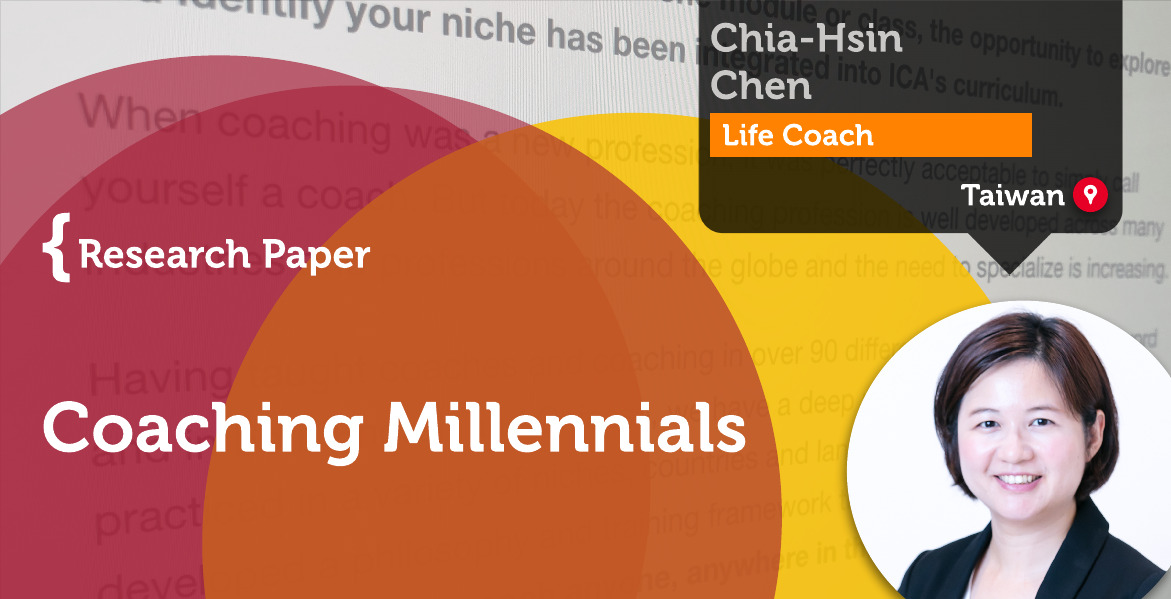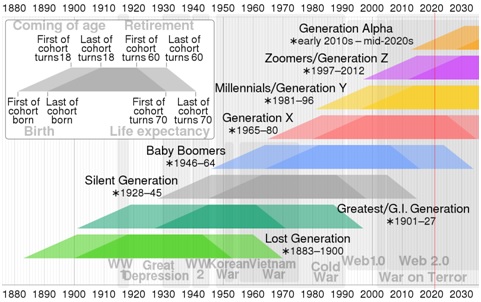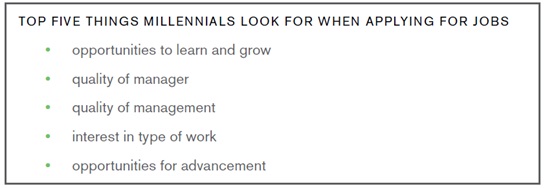A Research Paper By Chia-Hsin Chen, Life Coach, TAIWAN

Coaching with Millennials (1981-1996)
Due to the HR job nature, I have many opportunities to interact with different groups of people, both internal and external. Lately, I read an exciting article about Millennials from Gallup telling about how Millennials change their mindset when looking for jobs. Millennials are the group who will change the world more than any other generation, and 75% of my colleagues from the current company happens to be millennials. Thus, I am interested to know more about these people and doing some interviews and surveys based on the following listed aspects within the company. I will also share the survey result with Gallup data in the next paragraph.
The definition of Millennials based on Wikipedia is the year born between 1981-1996 (age 25-40).
 Following are few areas which show how millennials want to work and live, according to Gallup. Few of them match the interview results I have done in the company.
Following are few areas which show how millennials want to work and live, according to Gallup. Few of them match the interview results I have done in the company.
Opportunities to Learn and Grow
According to Gallup, millennials change jobs more often than any other elder generation. Guess which factors of following millennials care more when they change to a new job? Money? Location? Management style? None of the above. The opportunities to learn and grow are significant for millennials when looking for a new job or stay. In my late interviews with millennials, they ask for training resources or job advancement opportunities from time to time. I believe most companies provide new hire orientation/training when new employees get on board. For some particular positions, on-the-job training may be required from three months to a year based on the company policy and job functions. These are the direct opportunities to learn and grow.
Training sometimes costs a lot of money and manpower, and the company needs to be more flexible for learning and opportunities. Instead of providing sit-in-class training, the companies often use short-term assignments for people to develop their skills set and see if they are potential for the next career move. The short-term assignment can be within the same team or across different departments, and usually, it will have something new/challenges from the current job responsibility. During the short-term assignment, the purpose of observation is to know the potential of this candidate and the commitment or pressure taken ability when the new challenges come. Most millennials from my company are looking for growth opportunities through short-term assignments.
Quality of Manager/Quality of Management
Quality of manager is extremely important and vital for most generations when considering a new job. According to Gallup, “millennials want to work for managers who can support, position, empower and engage them and who care about them as employees and people. Same thing for the quality of management. Millennials want to work for great managers, but they also take into consideration an organization’s overall management and how this group presents and conducts itself.”
There is no surprise that the companies do the reference check, but all the interview candidates do the same thing for the company they are applying for, particularly the management team reference. The most common questions I hear from the applicants are what are the company cultures look like or what is the company plan in the coming up three to five years, or what is the KPI for the job they are applying for? The answers to the above questions will determine how the management team leads the company and its leadership style and culture.
To help candidates know the management team better, sometimes we will do a group interview. We will invite few employees from the same team to share their working experience and answer the candidate’s questions. Most millennials feel more real and comfortable when they hear the sharings from the team members instead of leaders. We do have a lower turnover rate if millennials are hiring through the group interview process.
Interest Is a Type of Work
According to Gallup data, “interest in the type of work they do is also high on millennials’ lists, with 58% of millennial job seekers indicating this factor is extremely important to them. A similar percentage of baby boomers (57%) rate this attribute as extremely important, while fewer Gen Xers (43%) do the same”.
In my past pharmaceutical/life science company experiences, some positions such as scientist and lab technician are highly asking their interests of work while applying for the job. This group of people used to work either at an academic organization or research lab. When I ask them why to change the job, the answer from the millennials is they want to see if what they are doing in the lab can really apply in the world. They want to experience the job they are doing is meaningful and can impact the real world. That is the reason why they decide to switch the job from academic to corporate. It is quite important that the employer can deliver the full picture of the job content and the impact applicants need to work on because that is the pressure where they will encounter. I have experienced some turnover due to the gap in understanding the reality between the academic and corporate working environments.
Opportunities for Advancement
Most people look for advancement opportunities at jobs, and there is no exception for millennials. According to Gallup, 50% of millennials believe advanced opportunities are extremely important when applying for jobs. This category is very similar to previous learning and development. Millennials are looking for knowing more detail about the jobs and which areas they can demonstrate their ability while shaping their skills.
I interview some millennials new hires and wondering if there is any other expectation for advancement opportunities. To my surprise, they are looking for the rolling update every other period. Although they all know the job they are doing now, the market trend and company priority may slightly modify based on the business requirement. Thus, these millennials would like to know all the updates at least bi-weekly. By doing so, people will aim more accurately toward the projects and align the company goals. Also, they will be eager to hear the promotion or career path development with these efforts.
I also interview these millennials leaders, they share with me that leading millennials need to be more penetrated about the information, so everyone is on the same page. One of the leaders uses the Agile way during the weekly meeting. This leader requires everyone to do the ten-minute briefing regarding what the team focuses on doing the current week and what is missing from the previous week. All members can hear everyone’s work and the information and the work progress are crystal clear. Another exciting thing is that they are requested to stand up instead of sitting on the chair while doing the ten-minute sharing. Standing up sharing keeps people more focused, and the result is perfect according to more than one team member’s feedback.
There is much information talking about similar categories regarding career expectation or management to millennials as above. However, I found a website with another two aspects that I think are pretty interesting and meaningful for further discussion. The first one is employee recognition, and another one is chosen is trust.
Employee Recognition
How often does the company do employee recognitions? Based on my past experiences, normally, the company will do twice a year. The timing for twice reviews is one in the middle of the year- interim review and another one at the end of the year called a year-end review. Some companies will have other rewards-cash or non-cash to recognize people who have done outstanding jobs between those two reviews. Are these timing good enough for the millennials? According to the website named Blueboard, recognition is a necessity to the millennials. They prefer time recognition instead of waiting for the review time. I also interviewed millennials about in-time recognition. All of them agree and prefer in-time recognition. Instead of saying a good job or well done, these millennials also like to hear a specific recognition of what they are doing good from their supervisors.
Choice Is Trust
Millennials care about work-life balance, according to the blueboard website. I also interview the millennials from my company to clarify their definition of work-life balance. They reply me that they prefer work to be done during working hours. Thus, they would fully utilize their time and concentrate 100% to complete the task. Once they get off from work, they will take the chance to improve themselves, either learning new skills or get relaxed and fully recharged for the next day. Few of the millennials from my company also indicate the hybrid working mode as a work-life balance. Since 2020, it is the first time we have kicked off work from home mode during the pandemic period. Without traveling time and people interruption at the office, millennials feel more efficient and higher productivity to work at home. Once the covid situations get better, employers shall consider offering a hybrid working environment (home vs. office) as one of the working options for millennials.
Millennials Career Development Expectations
With the Gallup survey and interview data above, we know millennials’ expectations of career development are different from those of other generations. Thus, there are several aspects we can pay more attention to while doing coaching to millennials from the company or HR’s perspective.
- Blended coaching: we all know the purpose of a coach is to company the clients and partner them during the coaching session without giving advice or solutions. However, it is very challenging if you are the HR and your clients happen to be your colleagues. Or if your clients happen to be your subordinates. Not to mention that millennials would like to hear specific advice when they talk to their supervisors. Under these circumstances, you may want to apply blended coaching. According to International Coaching Academy, “Blended Coaching is when coaching is added to some other specialty or expertise. As a pure coach, you don’t give advice; however, as a blended coach, there are times when your specific advice and expertise is needed and requested.” When I apply these blended coaching skills, I always inform my client that I will take my coaching hat off for a while. After I have done the sharing, I will put my coaching hat back. I am receiving many positive feedbacks, particularly from the group of millennials based on my experiences.
- Coaching frequency: we mention that millennials prefer in-time response so they know how they can improve right away. However, according to Gallup, Millennials want feedback at work, but they don’t necessarily ask for it. So, what will be the ideal frequency to coach them? Based on my experiences, there is no rule for idea coaching frequency. The ideal frequency is coming from each individual whenever they need it. If I sense something is going on with my millennials colleagues, I may drop by and remind them I will be there if they need me. Believe it or not, after this drop-by reminder, most of them will take the initiative for the coaching help.
- Be authentic: we know millennials have different work perspectives or thoughts compared with other generations. However, they are still human beings. The desire to get help from the coach shall be the same as others. When we coach these millennials, we shall focus on each individual and pay attention to his/her need, want, concern. It will be nice to know millennials’ preferences in advance; however, instead of paying attention to which generations they are, we shall also play the authentic role of a coach.
With these research papers, I can reflect and investigate many interesting findings of millennials. Being a coach and also an HR manager, I shall utilize these findings and work toward the best interest of the millennials. I look forward to seeing the changes and growth of this group of people. I will also learn a lot from them through the following coaching journey.
References
https://en.wikipedia.org/wiki/Millennials
https://www.gallup.com/workplace/336275/things-gen-millennials-expect-workplace.aspx
https://www.blueboard.com/blog/top-3-expectations-from-your-millennial-employees
https://archive.coachcampus.com/life-as-a-coach/blended-coach/
https://www.gallup.com/workplace/236450/managers-millennials-feedback-won-ask.aspx